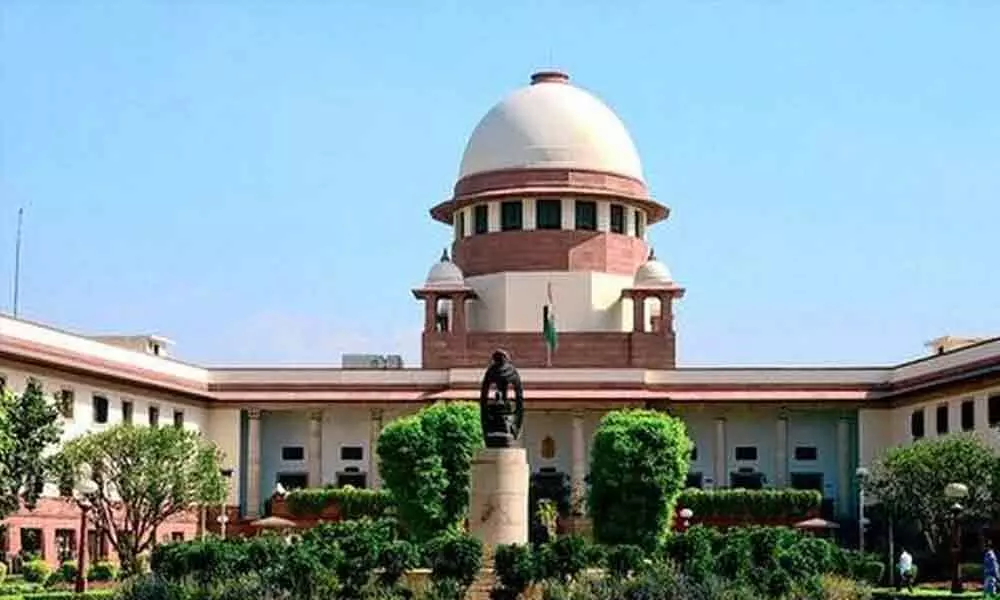Live
- G20 Leaders Will Talk About Climate, Taxes, and Trump's Return in Brazil
- COP29: CDRI announces $8 million funding for 12 projects to address climate crisis
- Anti-Telgu remarks: Actor Kasthuri Shankar moves court for bail
- Samsung AR Smart Glasses Set to Launch in 2025, Featuring Ray-Ban Meta-Like Design
- Kerala Industries Minister confident that new policy will boost plantation sector
- Madras HC plans inter-departmental monitoring committee to combat drug use in TN
- Bihar: Spotted deer dies due to heart attack in Banka district
- Mushtaq Ali T20: Shami to spearhead Bengal bowling attack, Gharami named captain
- Kharge's clarion call to oust Maharashtra's BJP-backed MahaYuti
- Why Ukraine’s Use of US Missiles Against Russia Could Lead to World War 3
Just In
'Not a marginalised community': SC refers Maratha quota to larger bench


Supreme Court
Referring the Maratha quota issue to a larger bench, a three-judge bench of the Supreme Court has held the community which comprises 30 per cent of the population in Maharashtra
New Delhi: Referring the Maratha quota issue to a larger bench, a three-judge bench of the Supreme Court has held the community which comprises 30 per cent of the population in Maharashtra cannot be compared to marginalised sections of the society living in far-flung and remote areas.
Staying the operation of the Maharashtra State Reservation for Socially and Educationally Backward Classes (SEBC) Act 2018, and referring the issue to a bench of five judges or more for final adjudication, a bench of Justices L. Nageswara Rao, Hemant Gupta and S. Ravindra Bhat on Wednesday said that the state has failed to make out a special case for providing reservation in excess of 50 per cent.
"The social, educational and economic backwardness of a community, existence of quantifiable data relating to inadequacy of representation of the community in public services and deprivation of the benefits flowing from reservations to the community are not exceptional circumstances for providing reservations in excess of 50 per cent," the bench said.
The apex court said it is prima facie of the opinion that the Bombay High Court committed an error in treating the above factors as circumstances which are extraordinary, warranting relaxation of the strict rule of 50 per cent.
"Admittedly, reservations provided to the Maratha community were implemented in educational institutions for one academic year only. Implementation of the Act for admissions in educational institutions and appointments to public posts during the pendency of these appeals will cause irreparable loss to the candidates belonging to the open category," said the bench.
Staying the Maratha reservation in jobs and education, the bench observed that it will be difficult to cancel the admissions made in the educational institutions and appointments made to the public posts by implementing the reservations as per the Act. However, the top court said the admissions made to postgraduate medical courses shall not be altered.
The top court observed it was categorically held that reservations contemplated in Clause (4) of Article 16 should not exceed 50 per cent. The relaxation of the strict rule of 50 per cent can be made in certain extraordinary situations.
"People living in far-flung and remote areas not being in the mainstream of national life should be treated in a different way. In view of the conditions peculiar to them they are entitled to be given relaxation," noted the bench, emphasising that extreme caution has to be exercised and a special case made out for relaxation of the rule of 50 per cent.
The parties involved in the matter had urged the bench to refer it to an 11-judge bench, where they could examine whether the 50 per cent cap on reservation could be breached or not.
The pleas have challenged the Bombay High Court's June 2019 judgement, contending that the Act, which provides for quota to the Maratha community in education and jobs, violated the principle laid in the 9-judge bench judgement of the apex court in 1992, which capped the reservation at 50 percent.
The High Court had upheld the Maratha quota, ruling that reservation should be 12 per cent in jobs and 13 per cent in education.

© 2024 Hyderabad Media House Limited/The Hans India. All rights reserved. Powered by hocalwire.com






